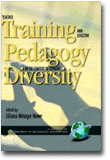
Teacher Training and Effective Pedagogy in the Context of Student Diversity
Edited by:
Liliana Minaya-Rowe, University of Connecticut
A volume in the series: Research in Bilingual Education. Editor(s): Mileidis Gort, University of Colorado Boulder.
Published 2002
The purpose of this volume is two-fold. First, the book attempts to initiate a research-based dialogue from a variety of perspectives specifically about teacher training and teaching in the context of student linguistic and cultural diversity; and, second, to cast a wide net over three major areas of professional development that have the potential to impact on teacher quality and on the educational services provided to ELLs at all levels of instruction. This book represents a first attempt to a quiet revolution going on in teacher education (Johnson, 2000). It allows the reader to uncover research activities and experiences that constitute individual teacher education program initiatives. A revolution, because it is stirring the very essence of what stands at the core of teacher education, a core that has long been based more on training to teach monolingual English speaking students and less on teaching ELLs, their first and second language development, using their bilingualism to teach academics, and on the process of becoming an effective teacher of ELLs.
This state-of-the-art review brings together research on effective pedagogy and teacher training. The nine feature chapters are directly concerned with effective new structures and practices for professional development and are presented in a framework that considers a wide spectrum of topics to address issues such as: what teachers need to understand about English language learners, what kind of professional experiences are likely to facilitate those understandings, and what kinds of teacher education programs and school settings are able to support their ongoing learning. The authors also discuss the implications of their work for helping English language learners connect and benefit from school from the points of view of (1) school reform, (2) teachers’ bilingual proficiencies, (3) teachers’ knowledge and beliefs, and (4) teacher training programming and sustainability.
-
Paperback978-1-930608-78-8
Web price: $45.04 (Reg. 52.99)
-
Hardcover978-1-930608-79-5
Web price: $80.74 (Reg. 94.99)
- eBook9781607525240

-
 (Re)Envisioning Social Studies Education Research
Current Epistemological and Methodological Expansions, Deconstructions, and Creations
(Re)Envisioning Social Studies Education Research
Current Epistemological and Methodological Expansions, Deconstructions, and Creations
-
 Effective Educational Programs, Practices, and Policies for English Learners
Effective Educational Programs, Practices, and Policies for English Learners
-
 ESL, EFL and Bilingual Education
Exploring Historical, Sociocultural, Linguistic, and Instructional Foundations
ESL, EFL and Bilingual Education
Exploring Historical, Sociocultural, Linguistic, and Instructional Foundations
-
 Innovative Curricular and Pedagogical Designs in Bilingual Teacher Education
Bridging the Distance with School Contexts
Innovative Curricular and Pedagogical Designs in Bilingual Teacher Education
Bridging the Distance with School Contexts
-
 Negotiating Social Contexts
Identities of Biracial College Women
Negotiating Social Contexts
Identities of Biracial College Women
-
 Qualitative Research With Diverse and Underserved Communities
Qualitative Research With Diverse and Underserved Communities
-
 The Bilingual School in the United States
A Documentary History
The Bilingual School in the United States
A Documentary History

